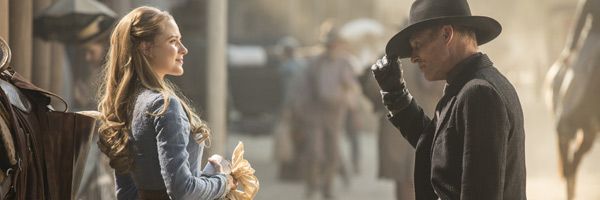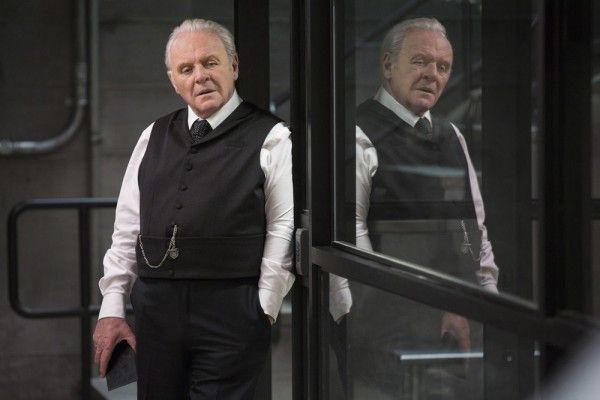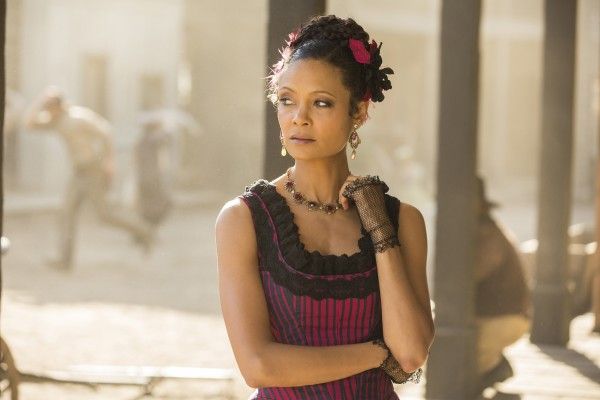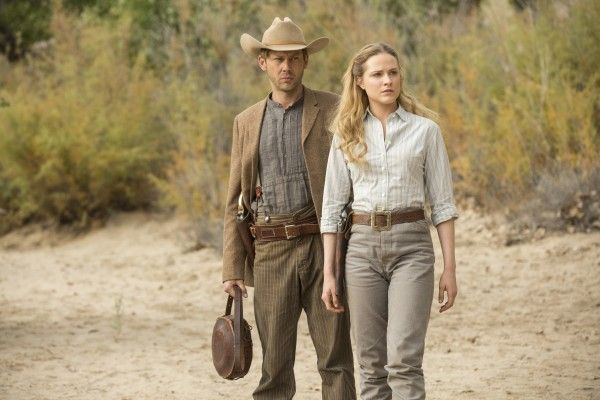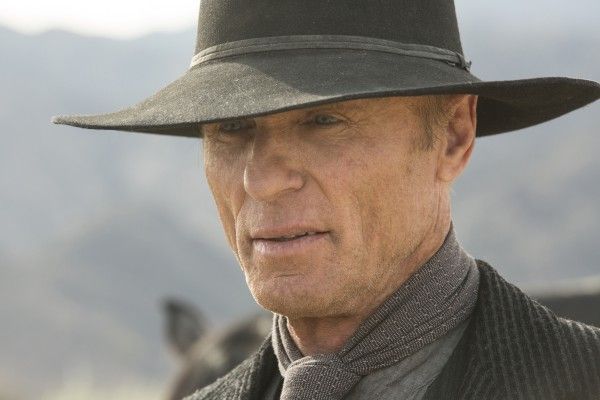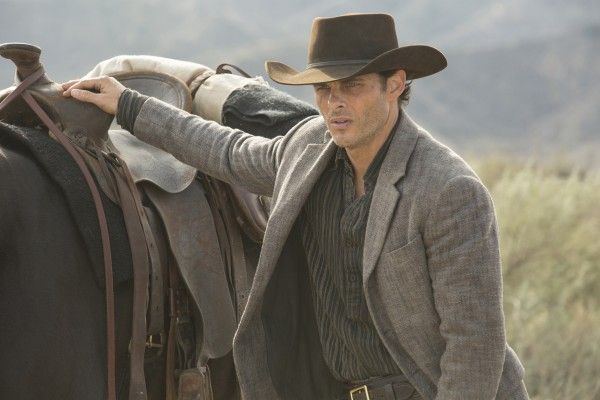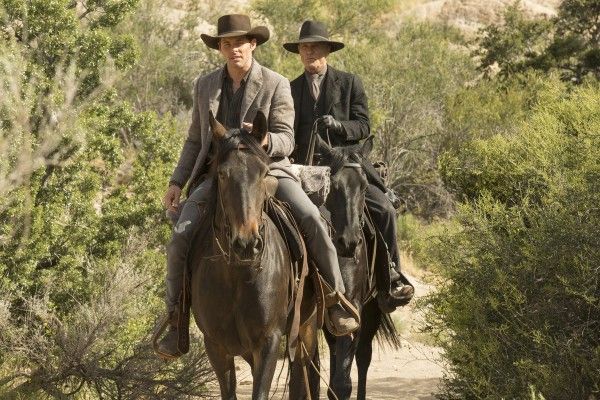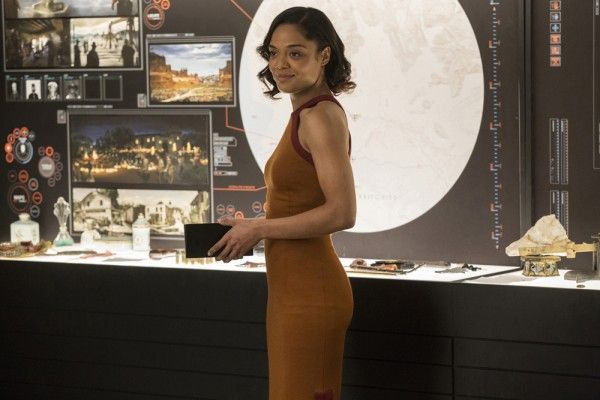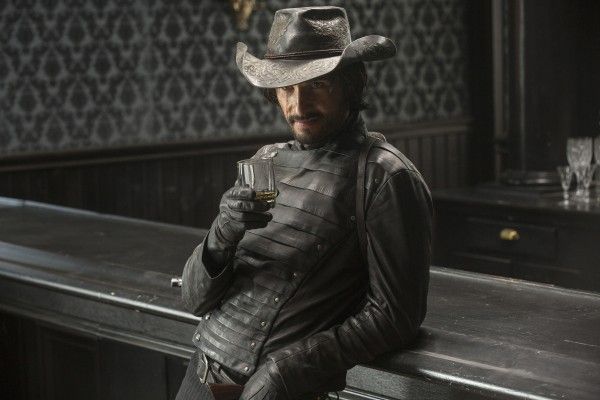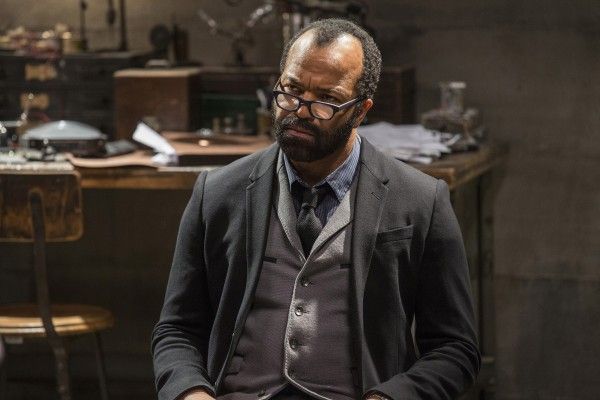The line between humans and hosts is even further blurred in “Trace Decay” as we learn more about Maeve’s tragic backstory, watch Bernard grapple with his guilt over Theresa’s murder, and find out why the Man in Black is so darn obsessed with the maze. Here’s everything that happened in this week’s Westworld:
Ford makes Bernard forget.
“Trace Decay” picks up very soon after “Trompe L’Oeil,” in the aftermath of Theresa’s death as Bernard desperately struggles to comprehend what he has done. He loved Theresa, so why did he kill her? The short answer: because Ford told him to, because it compromised the new storyline. For Bernard, that’s not good enough. He has more humanity than most of the humans we know. Like Dolores, he seems to be a profoundly compassionate, moral being. Ford, not so much.
When Bernard tries to lash out at Ford in anger, his creator simply tells him not to. He has more power than any one man should be allowed to have over other beings. And he is arrogant in how he wields it. He offers Bernard what he thinks every human truly wants: to forget the pain. But, as we’ve seen both Bernard and Maeve mention now: “The pain is all I have left.” When you lose someone, the only thing worse than grieving them, is forgetting. Ford makes the hosts forget, again and again. He takes away the people they love not once, but twice, and something tells me that, eventually, the hosts will enact their revenge for the pain Ford has stolen from them.
The saddest thing about Ford’s rigid belief is that it implies that what he wants more than anything else is to forget his own pain. Perhaps he is too much of a control freak to ever take the chance, were it to be given to him, but he seems to believe that it would be the ultimate gift. He takes away the pain of the hosts because he cannot take away his own pain. He cannot make himself forget. And though this does not excuse Ford’s actions and it doesn't take away from the fact that he is some kind of monster, it is sad.
Meanwhile, Stubbs’ suspicions are piqued when he mentions Bernard’s relationship with Theresa to Bernard, and Bernard very convincingly denies it. (He is convincing because he believes they were just colleagues. Ford completely erased their intimate relationship from Bernard’s brain.) Will Stubbs begin to put the pieces together himself?
Maeve writes her own story.
While Ford may still have the most power within this narrative, Maeve is gaining some serious ground. After convincing Felix to change her main code, she is not only able to hurt humans, but also has some sort of form of compulsion over her fellow hosts. She gets to articulate their character motivation. She gets to write their stories and, with it, her own.
Though Maeve claims that the narrative loops that have been her life up until now have no hold over her, the opposite proves to be true when she remembers more of her life as a homesteader with a daughter. In the middle of a reverie, she slashes Clementine’s throat as she remembers trying to slash the Man in Black’s throat after he killed her daughter. It directly endangers what she has claimed to be her primary goal: escaping the park. Now, the Westworld behind-the-scenes crew know that something is up.
The most fascinating part of Maeve’s evolution, however, is the reveal that it started long before the show began, roughly a year ago when she left the homesteader arc and became a madame. After watching the Man in Black shoot her daughter in cold blood, Westworld programmers are unable to calm her down. She doesn’t respond to voice commands. She is hysterical. Ford manages to work his “magic” long enough to erase her memory… almost. Before he can, Maeve takes a scalpel and stabs herself in the throat. She would rather die with the memory of her dead daughter than do nothing as Ford takes those painful memories away from her.
The scene is fascinating not only for the proof that Maeve has been kicking towards consciousness much longer than we might have supposed, but that Bernard saw Maeve’s rebellion. When she tells Ford that she wants her pain, that it’s all she has left of her daughter, Bernard’s face contorts in confusion. This is what he tells others when asked about his son. Bernard is definitely not as quick to suspect as Maeve or Dolores, but he is beginning to get all of the pieces he needs to figure out that something is up and that Ford cannot be trusted.
Charlotte recruits Lee for a special mission.
When Theresa is found dead at the bottom of a ravine, Charlotte doesn’t believe the story that she slipped and fell for even a second. (And how amazing is the scene that sees Ford and Charlotte feeding lies to one another, both seemingly aware that the other doesn’t believe a word they are saying?) Charlotte might not have liked Theresa personally, but she knows that she was loyal and she knows that she was careful. But she’s going to play this smart.
There might not be any evidence of Bernard’s involvement in Theresa’s personal life or death after Bernard carefully removed it (and then Ford removed it from Bernard’s brain), but Charlotte seems like a determined sort. She recruits Lee as a willing lackey in her plot, digging Peter Abernathy out of cold storage and asking Lee to put 35 years worth of data into his brain. After all, she still needs to get all of that data out of the park somehow before she can fire Ford.
Dolores goes home.
Dolores and William finally reach the place that Dolores remembers from her dream. It’s the cross we saw Ford bring Bernard to when he was announcing his new narrative many episodes ago. But that’s not what Dolores sees. She sees an entire town populated with younger versions of many of the hosts we have come to know. Maeve is there, as is Angela (the host who greeted William when he first came to the park). So is Lawrence’s daughter, though it’s unclear if she is actually in the memory or part of Dolores’ dream, as she engages Dolores, saying: “Lovely to see you. Good morning. Did you find what you were looking for, Dolores?”
Given the training many of the hosts are undergoing, it seems like this is a memory from a much earlier time in the park’s history. Everything turns bloody when Dolores comes in and starts shooting people. Was it really Dolores who pulled the trigger or is Dolores simply seeing herself in the role as she remembers? And why did it cause Dolores to try to shoot herself in present-day? Was this what Arnold’s destruction of the park looked like, not a rebellion so much as a massacre?
William manages to pull Dolores out of her reverie before she can put a bullet in her own brain, but we do glean some clues from her panicked rambles: “When are we? Is this now? Am I going mad? Are you real?” The “when are we” seems particularly relevant. Many fan theories center around the idea that different subplots take place at different points in time. This seems especially possible when it comes to the hosts, as they’re memories are perfect, identical to what it is like to experience something in the present. Unfortunately, Dolores doesn’t stick around to go further down the rabbit hole, pulled away by William who is in full-on Overprotective Boyfriend mode. They don’t get far before running into Logan -- who has been hunting for William for days -- and his confederado friends. Not the friendliest crowd to run into so far from Sweetwater.
The Man in Black tells his story.
Perhaps more than any other character on this show, The Man in Black has been a huge question mark. Is he human or host? Why is he so obsessed with the maze? And why is he so darn mean? In “Trace Decay,” we get most of those questions answered. The Man in Black is, as that earlier interaction with a fellow guest teased, a successful businessman and philanthropist. What we couldn’t glean from previous clues is that he suffered a very personal tragedy last year when his wife killed herself. The Man in Black’s daughter blames him. According to the daughter, the wife was always afraid of him. Even though he never hurt his family, they feared he would “blow up or collapse, like some dark star.” This fear isn’t so hard to believe, given what we’ve seen from The Man in Black so far. Not a charmer.
So The Man in Black came back to Westworld to find out once and for all if he was the monster his wife believed him to be. He designed his own test, killing Maeve’s daughter to see how it felt. He felt “nothing,” which makes it pretty impossible to garner any sympathy for this guy. The moment did, however, lead him to the maze because he glimpsed, in the moments following the girl’s death, something human in Maeve. In her grief, she was alive, according to The Man in Black. It was then that he saw the sign of the maze. What does this mean? Was it there all along? Is the maze not meant for The Man in Black because he is not a host? Was it meant for Maeve? So many questions, only two episodes left to answer them, but it’s hard to get behind the Man in Black’s character given his rather pathetic attempts that explaining his motivation. He was afraid he was a monster, so he acted like a monster. If grief is what makes hosts like Bernard and Maeve human, then it is what exposes The Man in Black’s lack of humanity.
The Man in Black’s monologue to Teddy did reveal an interesting fact: the belief that, in Arnold’s game, the hosts can hurt the humans. “That game cuts deep.”
Wyatt wants Teddy back.
While The Man in Black is recounting his backstory, Teddy is starting to remember bits of his own. Namely, that The Man in Black killed him and dragged Dolores off to the barn to rape her. It’s what prompts Teddy to knock him out and tie him up, but the cowboy won’t go so far as to kill him, even as Angela tells him he should. In an interesting parallel to the scene that sees William trying to convince Dolores to leave the dying union soldier, Teddy refuses to leave a tied-up Angela to fend for herself. He doesn’t kill The Man in Black. In some ways, the host/human dichotomy seems less helpful than the dividing line between characters with empathy and characters without. Character who justify violence and characters who know that justification doesn’t matter much in the face of pain and loss and grief. Characters who consider their effect on others and characters who think they matter more.
Before Teddy can figure out what he wants to do with The Man in Black, Angela stabs him with an arrow. She was a honey trap of sorts, designed to get Teddy to stop and help her so that she could deliver him into Wyatt’s waiting hands. The outlaw wants Wyatt back and, with an arrow to the shoulder, it doesn’t seem like Teddy is in much of a position to resist.
Rating: ★★★★★ Excellent
Miscellanea:
-- “God has nothing to do with it. You killed her because I told you to.” — Ford, somehow resisting the opportunity to straight-up call himself a god. (It’s worth noting that, later in the episode, The Man in Black calls himself a god.)
-- “Together, you and I captured that elusive thing: heart.” — Ford’s really proud of the fact that Bernard was able to fall in love with Theresa.
-- “You’re not the first man to threaten me. Arnold came to feel the way you do. He couldn’t stop me either.” Not yet, Ford. Not yet.
-- I’m not sure if we have any The Vampire Diaries fans in the audience, but both the way Ford talks about the ability to turn off emotions and Maeve’s compulsion-like skill reminded me of the teen romance drama.
-- How do we feel about the new Clementine?
-- Sylvester’s days seem seriously numbered, though Maeve seems to want to keep him around for now. One wonders how Felix feels about all of this. He is a blessed idiot. He really did think that Maeve wouldn’t hurt anyone.
-- We learned in tonight’s episode that all of the hosts have bombs in their spines that will explode if they leave the park. Of course. But Charlotte asked Lee to get Peter Abernathy on the train out of the park. There has to be a way to get around that bomb.
-- “Time to write my own fucking story.” — Maeve is the best.
-- “Look at him, he’s a child. He doesn’t know why he’s fighting.” — Dolores
-- Who do we think the voice in Dolores head sounds like?
-- “It’s a desponding end to her story, isn’t it?” Ford is so bad at acting sad and/or surprised that Theresa died.
-- Ford plans on automating most of the park’s safety protocols, which seems like the final step before the robot revolution.
-- Watching this episode, I thought a lot about the timeline for this season so far. Barring any weird time travel stuff, it seems like all of the stuff that’s gone down has happened in a relatively short amount of time. A matter of weeks, at the most.
-- Bernard seemingly remembers killing Elsie right before Ford erases his memory of Theresa. Does this mean he will also remember killing Theresa, eventually? (R.I.P., Elsie.)
-- “Wyatt’s men. They killed everyone.” “That’s Wyatt’s way. I was there the first time. He destroyed my world.” Could Wyatt be Arnold? Discuss.
-- “That isn’t Wyatt. That’s busy work.” Tessa Thompson continues to be delightful as Charlotte Hale. Any actor who can hold their own against Anthony Hopkins is something special. Can’t wait to see her in Thor: Ragnarok.
-- “Show, don’t tell. Isn’t that what you writers prefer?” — Charlotte
-- “Now, it’s time to recruit your army.” — Maeve
-- Insert obligatory, weekly round of applause for Thandie Newton here.
-- “What’s the difference between my pain and yours? Between you and me?” — Bernard
-- “We can’t define consciousness because consciousness doesn’t exist … We live in loops, as tight and as closed as the hosts do. Seldom questioning our choices, content for the most part in being told what to do next.” — Ford really lays out a central theme here, but will Westworld inevitably subvert it with its robots’ rise to consciousness? After all, Ford isn’t the hero of this story.
-- “No, my friend, you’re not missing anything at all.” — Ford really hates being human.
-- “This is what Arnold wants. He wants me to remember.” — Dolores
-- “It’s the circle of life, or the approximation of it. Even the dead fulfill a purpose.” — Charlotte
-- Guys, Stubbs is really nice.
-- “Save Dolores or die trying.” — Teddy’s mantra
-- “You’re a fucking animal.” — Teddy, to The Man in Black
-- “You’ve been gone a long time, Theodore. Wyatt will need you soon.” — Angela

